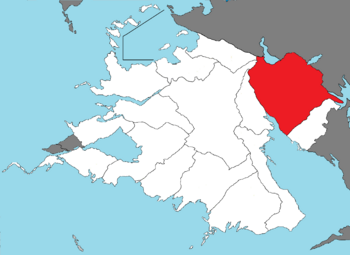Mayotte (Province): Difference between revisions
No edit summary |
|||
| Line 101: | Line 101: | ||
==Culture== | ==Culture== | ||
{{Template:Zamastan}} | |||
[[Category:Zamastan]][[Category:Places]][[Category:Culture]][[Category:Administrative Districts of Zamastan]] | [[Category:Zamastan]][[Category:Places]][[Category:Culture]][[Category:Administrative Districts of Zamastan]] | ||
Revision as of 04:24, 29 October 2020
Mayotte | |
|---|---|
 Mayotte located in Zamastan | |
| Capital | Blythe |
| Government | |
• Governor | Thomas Braitwhite |
| Population | |
• Estimate | 27,132,000 |
Mayotte is an Administrative District (Province) of Zamastan. The history of Mayotte spans thousands of years, with much of the Fifty Years War between the Drambenburgian kingdoms and the Palatinate of Aunistria in the 1300s, the Parabocan War in the late 1800s, and sections of the World War being fought in this province. While being a administrative region of Zamastan since the 1880s, Mayotte has long harbored nationalist and separatist sentiment, largely wishing independence or greater autonomy from the federal government. The election of President Atticus Moreau, a member of the Bloc Mayotte Party, in 2020 boosted the hopes for independence.
Blythe, the provincial capital of Mayotte, is also the largest city. Roughly 30% of the province's population is direct descendants of first or second generation immigrants, mostly Avergnonian, Drambenburg, East Chanchajilla, and Tinten. The province has a highly diversified economy, with major sectors including transportation, education, information technology and research, government services, and mining and a major tourist destination for outdoor recreation. Much of the population speaks Avergnonian or Drambenburgian, making it alongside neighboring Aunistria the two largest populations of second-language speakers.
